初中英语七年级一般现在时、频度副词讲解及练习
初一英语一般现在时讲解及练习

一般如今时( Simple Present Tense) 【1 】界说:暗示平日性.纪律性.习惯性.真谛性的状况或者动作的一种时光状况.一.消失以下情形是用一般如今时:1)经常性.习惯性的动作或消失的状况.(当暗示习惯性动作时,常与频度副词连用,罕有的频度副词有always, often, usually, sometimes, hardly ever, never等.)e.g. I go to school on foot.I often do my homework at 7:00.He usually goes to the park on Sunday morning.He is very busy now.2)暗示主语的特点.性情.才能.快活爱好等.e.g. He can swim.I work hard.I like watching TV.3)暗示客不雅真谛e.g. There are seven days in a week.The moon moves round the earth.二、一般如今时的句式变更:1、动词be接洽动词be是暗示谓语关系的动词,它的后面必须加表语(平日为名词.形容词或介词短语).在一般如今时中,be动词有三种情势:一.用be的恰当情势填空1.---How____ you? ---I____ fine.2.I___ David,and my family name___ Green.3.---What color ___ your clock? ---It___ white.4.---What___ this in English?---It___ an apple.5.Toy___my brother.David____my brother,too.They ___ my brothers.6.Look!These____apple trees.7.We____ good students and you____ good teacher.8.My sister and my brother_____ students.9. _____there many eggs in the kitchen?10.____your card number 5578?11.Where_____ your pencils?12.These sweaters ______ fifty dollars.13.How much ____ his jacket?14.My brother’s birthday____ December 11th.15.When _____ Kate’s birthday?16.There_____a boy and two girls beside the gate.17.Five and three ____ eight.二..将下面的句子变成一般疑问句.1. That is my football.2. Those are his books.3. Jim and Tom are good friends.4. My birthday is November 1st.5. His son is twelve years old.三.将下面的句子变成否认句1. His card is on the table.2. These are my parents.3. Bob and Tony are our friends.4. These things are five dollars.5. The girl is his sister.四.划线提问1. Our teachers are in the classroom.2. The girl’s telephone number is 032-55746.3. Her pen is black.4. September 10th is Teachers′ Day.5. They are thirteen years old.6. The boy is fine.7. The old man is my grandfather.8. These eggs are five yuan.2.实义动词do.1)暗示动作, 一般人称作主语的,变否认句须在动词前加助动词don’t;变一般疑问句须在句首加助动词do.E.g.确定句They have lunch at 12:00.否认句They don’t have lunch at 12:00.疑问句Do they have lunch at 12:00?2)单三人称做主语的,变否认句须在动词前加助动词doesn’t;变一般疑问句须在句首加助动词does.e.g. 确定句:He goes to school by bike.否认句:He doesn’t go to school by bike.疑问句:Does he go to school by bike?现实操练1. I have many books. (改为否认句)2.Tom does his homework at home.否认句:一般疑问句:3.Mingming usually waters the flowers.否认句:一般疑问句4.Su Yang usually washes some clothes on Saturday.否认句:5. I usually play football on Friday afternoon.否认句:一般疑问句:强化练习一.写出下列单词的第三人称单数情势1. work__________ read__________ clean__________ write__________2. teach__________ wash__________ guess__________ watch__________3.go__________ do___________ 4.study__________ fly__________ cry__________ play__________5.have__________二.选择( ) 1. _____ you have a book? A. Do B. Are C. IsD. Have()2. They _________ on a farm. A.are working B. is work C. working D. is worked() 3. Does Peter like to watch TV?__________. A. Yes, he like B. No, he doesn’t C. Yes, he’d like D. No, he likes( )4. She does n’t __________ her homework in the afternoon. A. doing B. to do C. does D. do( )5. How____________ Mr. Brown ___________ to America? A. do, go B. is, go C. does, go D. does, goes()6. Where’s my camera? I____________ it. A. am not finding B. am not seeing C. can’t find D. can’t look at()7. How ___________ he go to work? He ___________ to work by bike. A. does; go B. do; goes C. do ; go D. does; goes( )8. ______ you usually late for school? No, _____________. A. Do; I am B.Does ;not C. Are ; I’m not D. Are ; I aren’t()9. _____ she _____ home at six every day? A. Is , leave B. Does , leave C. Is , leaves D. Does , left( )10. Mr. Yang ____________ English this term. A. teaches our B. teaches us C. teachs us D. teach our三.用所给动词的恰当情势填空.1. My classmate ______ (know) the man on the bike.2. His sister usually ______ (go) to school at 7:00 am.3. Lin Tao ______ (like) his new sweater.4. Let me ______ (have) a look.5. Let’s ______ (play) tennis!6. ______ he ______ (like) English?7. I want ______ (go) t o a movie.8. He ______ (not know) the teacher’s name.9. Nice ______ (meet) you!10. Can I ______ (ask) the policeman?11. ______ (sit) down and ______ (have) a cup of tea.12. ______ (not look) at your book!13. ______ you ______ (can see) the bananas on the table?14. I need ______ (buy ) some new clothes.15. She likes ______ (play) chess.16. It’s time ______ (play) games.17. You must v (be) a good student.18. She must ______ (sing) well.19. He ______ (have) an egg and a banana for breakfast.20. Li Min ______ (take) a shower after lunch.21. People usually ______ (eat) dinner in the evening.22. What time ______ Mary usually ______ (play) basketball ?23. This boy likes ______ (play) chess with his father on weekends .24. Where ______ his parents ______ (work) now, do you know? 25. Who ______ (teach) you English in your school?26. Helen, ______ (not be) late for class again. 27. I don’t like the movie. It’s______ (born). 28. ______ (not look) at the pictures. ______ (listen) to me. 29. Little Tom can ______ (ride) a horse. 30. The weather ______ (be ) windy to day.四.改句子1.Do you often play football after school? (确定答复)2. He doesn’t have any paper.(改为确定句)3.Gao Shan's sister likes playing table tennis (改为否认句)4.She lives in a small town near New York. (改为一般疑问句)5.I watch TV every day. (改为一般疑问句)6 We have four lessons.(否认句)7. Nancy doesn't run fast (确定句)8. .Mike has two letters for him. (一般疑问句)。
一般现在时频率副词

目录
• 频率副词在一般现在时中的作用 • 一般现在时中常用的频率副词 • 一般现在时频率副词的用法与注意事项 • 一般现在时频率副词的练习与解析 • 一般现在时频率副词的常见错误与纠正方
法
01
频率副词在一般现在时 中的作用
定义与特点
定义
频率副词是一类表示动作发生频率的副词,常用于一般现在时态中,描述某个 动作发生的次数或频繁程度。
通过使用频率副词,可以表达说话者 对某个动作发生频率的主观评价和态 度,如“他总是迟到”表示说话者认 为对方经常迟到。
02
一般现在时中常用的频 率副词
always(总是)
总结词
表示动作或状态始终如此,没有例外。
详细描述
always用于强调动作或状态的持续性和一贯性,表示始终如此,没有例外。它通 常用于描述习惯性或反复发生的动作或状态,强调动作或状态始终保持不变。
常见错误二:频率副词与时间状语的搭配不当
总结词
频率副词与时间状语的搭配不当是指在使用 频率副词时,没有正确地与时间状语进行搭 配,导致句子意思表达不准确。
详细描述
例如,在句子"I usually watch TV on weekends"中,时间状语"on weekends" 应该与频率副词"usually"进行搭配,表示 通常在周末看电视。因此,正确的句子应该 是"I usually watch TV on weekends."
频率副词与时间状语连用时的注意事项
频率副词与时间状语连用时,应放在时间状语之前,例如“我每周都去健身房锻 炼”,在这个句子中,“每周”是时间状语,“都”是频率副词,应放在时间状语 “每周”之前。
初一英语一般现在时讲解及练习

一般现在时( Simple Present Tense)定义:表示通常性、规律性、习惯性、真理性的状态或者动作的一种时间状态。
一、出现以下情况是用一般现在时:1)经常性、习惯性的动作或存在的状态。
(当表示习惯性动作时,常与频度副词连用,常见的频度副词有always, often, usually, sometimes, hardly ever, never 等。
)e.g. I go to school on foot.I often do my homework at 7:00.He usually goes to the park on Sunday morning.He is very busy now.2)表示主语的特征、性格、能力、爱好等。
e.g. He can swim.I work hard.I like watching TV.3)表示客观真理e.g. There are seven days in a week.The moon moves round the earth.二、一般现在时的句式变化:1、动词be联系动词be是表示谓语关系的动词,它的后面必须加表语(通常为名词、形容词或介词短语)。
在一般现在时中,be动词有三种形式:一、用be的适当形式填空1.---How____ you? ---I____ fine.2.I___ David,and my family name___ Green.3.---What color ___ your clock? ---It___ white.4.---What___ this in English?---It___ an apple.5.Toy___my brother.David____my brother,too.They ___ my brothers.6.Look!These____apple trees.7.We____ good students and you____ good teacher.8.My sister and my brother_____ students.9. _____there many eggs in the kitchen?10.____your card number 5578?11.Where_____ your pencils?12.These sweaters ______ fifty dollars.13.How much ____ his jacket?14.My brother’s birthday____ December 11th.15.When _____ Kate’s birthday?16、There_____a boy and two girls beside the gate.17、Five and three ____ eight.二、.将下面的句子变成一般疑问句。
频度副词讲解与练习
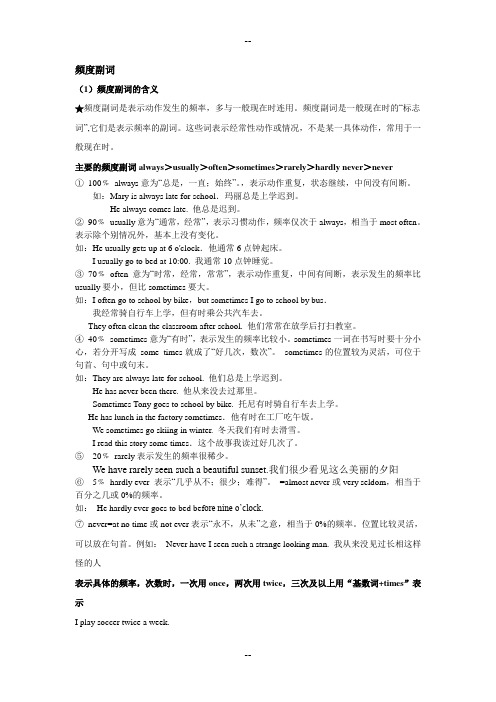
频度副词(1)频度副词的含义★频度副词是表示动作发生的频率,多与一般现在时连用。
频度副词是一般现在时的“标志词”,它们是表示频率的副词。
这些词表示经常性动作或情况,不是某一具体动作,常用于一般现在时。
主要的频度副词always>usually>often>sometimes>rarely>hardly never>never①100﹪always意为“总是,一直;始终”。
,表示动作重复,状态继续,中间没有间断。
如:Mary is always late for school.玛丽总是上学迟到。
He always comes late. 他总是迟到。
②90﹪usually意为“通常,经常”,表示习惯动作,频率仅次于always,相当于most often。
表示除个别情况外,基本上没有变化。
如:He usually gets up at 6 o'clock.他通常6点钟起床。
I usually go to bed at 10:00. 我通常10点钟睡觉。
③70﹪often意为“时常,经常,常常”,表示动作重复,中间有间断,表示发生的频率比usually要小,但比sometimes要大。
如:I often go to school by bike,but sometimes I go to school by bus.我经常骑自行车上学,但有时乘公共汽车去。
They often clean the classroom after school. 他们常常在放学后打扫教室。
④40﹪sometimes意为“有时”,表示发生的频率比较小。
sometimes一词在书写时要十分小心,若分开写成some times就成了“好几次,数次”。
sometimes的位置较为灵活,可位于句首、句中或句末。
如:They are always late for school. 他们总是上学迟到。
He has never been there. 他从来没去过那里。
Unit4 Time to celebrate频度副词和一般现在时七年级英语上册(外研版2024)
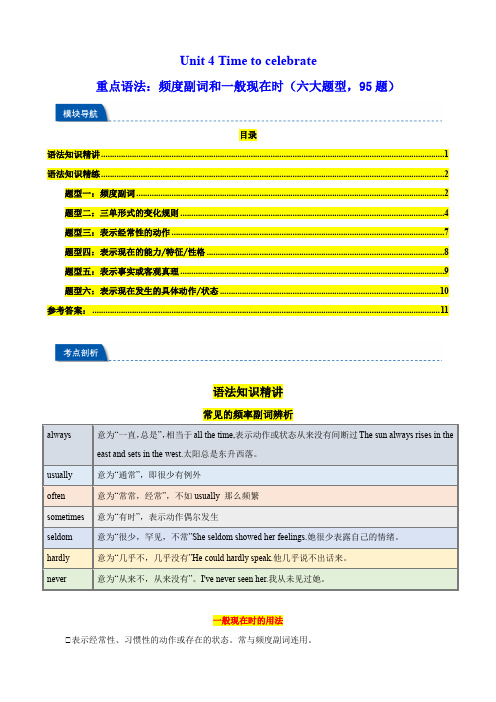
Unit 4 Time to celebrate重点语法:频度副词和一般现在时(六大题型,95题)目录语法知识精讲 (1)语法知识精练 (2)题型一:频度副词 (2)题型二:三单形式的变化规则 (4)题型三:表示经常性的动作 (7)题型四:表示现在的能力/特征/性格 (8)题型五:表示事实或客观真理 (9)题型六:表示现在发生的具体动作/状态 (10)参考答案: (11)语法知识精讲常见的频率副词辨析一般现在时的用法①表示经常性、习惯性的动作或存在的状态。
常与频度副词连用。
I often take a walk in the park. 我经常在公园散步。
These T-shirts are new. 这些T恤衫是新的。
①表示客观事实、真理。
The sun rises in the east and sets in the west. 太阳东升西落。
①在时间、条件状语从句中表示将来的动作。
If it doesn’t rain tomorrow, I will go bike riding in the open air. 如果明天不下雨,我将在户外骑自行车。
I’ll tell her the good news when she comes back. 当她回来的时候,我将把这个好消息告诉她。
①表示按计划或安排将要发生的动作,可用一般现在时表将来。
但只限于start,begin,leave,go,come,arrive,return,take place等。
一般现在时的构成在一般情况下用动词原形,若主语为第三人称单数,一般在动词原形后加-s或-es。
语法知识精练题型一:频度副词1.(23-24七年级下·河北唐山·期末)Tina gets to school early every day. She is ________ late for class.A.often B.usually C.never D.sometimes2.(22-23七年级下·安徽芜湖·期末)—Do you usually go to school by car, Rick?—No, ________. I ride a bike to school every day because it’s good for my body.A.never B.sometimes C.often D.always3.(23-24七年级下·河北邢台·期中)Lucy gets up early every weekday. So she ________ misses the bus.A.always B.never C.usually D.sometimes4.(23-24七年级下·云南昆明·期中)Cathy is ________ late for school because she gets up early every day.A.always B.usually C.sometimes D.never5.(23-24七年级下·河北石家庄·期中)Li Hong is ________ late for class. She is always the first to come to school.A.sometimes B.usually C.often D.never6.(23-24七年级上·江苏扬州·期末)—Helen is a top student and very good at English.—Yes. That’s because she ________ reads English in the morning.A.always B.sometimes C.seldom D.never7.(23-24七年级上·安徽合肥·期末)—Do you often play basketball after school?—________. I don’t like sports.A.Sometimes B.Never C.Often D.Usually8.(23-24七年级上·江苏盐城·期末)David likes Chinese history. He ________ visits the museums first whenever he travels in China.A.never B.seldom C.sometimes D.always9.(23-24七年级上·江苏淮安·期末)Bruce doesn’t like music, so he ________ buys CDs.A.always B.often C.sometimes D.seldom10.(23-24七年级上·江苏盐城·期末)Kitty goes to her swimming lessons every day. She ________ swims for half an hour.A.never B.sometimes C.seldom D.always11.(23-24七年级上·天津宁河·期末)I _________ listen to music or watch movies on the computer every Friday night.A.finally B.really C.lively D.often12.(23-24七年级上·江苏无锡·期末)—How often do you ride a bike with your brother?—________. You know it’s popular these days.A.More than an hour B.At weekends C.Twice a week D.Three times 13.(23-24七年级上·江苏宿迁·期末)I _________ go shopping in big malls. Online (网上的) shopping is so easy.A.sometimes B.seldom C.usually D.always14.(23-24七年级上·广东广州·期末)—You look strong and healthy. ________ do you do sports?—I ________ play football after school every day.A.How much, often B.How long, seldomC.How often, usually D.How soon, sometimes15.(23-24七年级上·江苏泰州·期末)—As a top football player, what does Messi like doing in his free time?—He is a good father. He ________ plays with his three sons ________.A.just; friendly B.often; happily C.seldom; lovely D.never; luckily16.(23-24七年级上·江苏苏州·期末)The baby girl couldn’t walk well at first, but now ________ fall down.A.seldom B.always C.often D.sometimes17.(23-24七年级上·天津南开·期末)In England, people ________ use Mr or Mrs before their first names.A.never B.often C.always D.sometimes18.(23-24七年级上·天津河东·期末)Lucy ________ like watching movies, and she ________ goes to the cinema.A.doesn’t; often B.don’t; often C.doesn’t; never D.don’t; never19.(23-24七年级上·安徽合肥·期末)Lucy is afraid of dogs, so she ________ wants to have a dog.A.always B.usually C.sometimes D.never20.(23-24七年级上·天津·期末)Mike is a good student. He ________ comes to school early. He is ________ late for school.A.often; always B.always; never C.never; sometimes D.sometimes; usually21.(23-24七年级上·天津河北·期末)Jane’s mother doesn’t like cooking. She ________ cooks at home.A.always B.usually C.often D.never22.(23-24七年级上·辽宁阜新·期末)My parents don’t like music and they _________ go to the concert.A.often B.usually C.sometimes D.never23.(23-24七年级上·广西桂林·期末)— How often do you go skating?— ________. Actually, I can’t skate at all.A.Always B.Usually C.Never D.Often24.(21-22七年级下·河北石家庄·期中)—Why does Tony ________ eat ice-cream at night?—Because he knows it’s bad for his teeth.A.always B.never C.usually D.sometimes25.(21-22七年级下·河北石家庄·期中)My cousin gets up very early every day, so he is ________ late for school.A.never B.always C.usually D.sometimes题型二:三单形式的变化规则26.(23-24七年级下·北京通州·期末)My dad is a PE teacher and he ______ young kids how to play football every Saturday.A.teaches B.taught C.is teaching D.will teach27.(23-24七年级下·河北唐山·期末)The clock ________ the kid at 7:00 every morning.A.gets up B.wakes up C.got up D.woke up28.(23-24七年级下·云南昆明·期末)Mike ________ of medium height and he ________ short hair.A.is, is B.are, have C.has, has D.is, has29.(23-24七年级下·山东青岛·期末)She usually ________ to music in the evening, but now she ________ TV.A.listens; watches B.is listening; watchesC.listens; is watching D.is listening; is watching30.(23-24七年级下·北京延庆·期末)Tom ________ to school by bike every morning.A.go B.went C.is going D.goes31.(23-24七年级下·湖北武汉·期末)Tony usually ________ to school on time, but this morning he ________ late.A.gets; arrives B.got; arrived C.gets; arrived D.got; arrives32.(23-24七年级下·上海闵行·期末)—What happens when water freezes?—It ________ into ice.A.turns B.will turn C.turned D.has turned33.(23-24七年级下·上海普陀·期末)When ice melts, it ________ into water.A.turns B.will turn C.turned D.is turning34.(23-24七年级上·江苏宿迁·期末)The hair clip ________ me well. I’ll take it.A.fits B.fit C.matches D.match35.(23-24七年级上·湖北随州·期末)— Let’s ______ volleyball.—That ______ good.A.play; sound B.play; sounds C.plays; sound D.plays; sounds36.(23-24七年级上·湖北孝感·期末)—Does Jim have a TV at home?—Yes, he often ________ football games on TV.A.watch B.watches C.to watch D.watching37.(23-24七年级上·江苏宿迁·期末)Look! Liu Tao ________ a new watch. It’s a birthday present from his grandfather.A.is having B.have C.are having D.has38.(23-24七年级上·天津红桥·期末)Bill likes reading. He ________ picture books with his dad every evening.A.read B.reads C.is reading D.are reading39.(23-24七年级上·河北邯郸·期末)Sam ______ with his friends every Wednesday.A.skates B.is skating C.skated D.will skate40.(23-24七年级上·安徽合肥·期末)—Look, mom ________ soup in the kitchen.—Oh, she always ________ delicious soup for us.A.makes; is making B.makes; make C.is making; makes D.is making;made41.(23-24七年级上·江苏淮安·期末)Sandy’s hair is long and she ________ glasses.A.wear B.wears C.wearing D.to wear42.(23-24七年级上·河北沧州·期末)Lucy ________ the bus and then walks to school every day.A.got off B.gets on C.got on D.gets off43.(23-24七年级上·河北邢台·期末)—Who ________ Chinese?—I think John ________.A.likes; does B.like; likesC.like; do D.likes; like44.(23-24七年级上·河北保定·期末)—Look out of the window! It ________ now.—Yes. It often ________ here in winter. But I like ________ days, because I like make snowmen with friends.A.snows; is snowing; snowy B.snow; is snowing; snow’sC.is snowing; snows; snow D.is snowing; snows; snowy45.(23-24七年级上·吉林松原·期末)—He ________ the book in a week.—Really? I don’t think so.A.finish reading (读)B.finishes reads C.finish reads D.finishes reading 46.(23-24七年级上·北京延庆·期末)Jim _______ art class. He is interested in painting.A.like B.is liking C.likes D.liked47.(23-24七年级上·江西赣州·期末)Han Mei, a good friend of mine, ________ me with my English every day.A.help B.is helping C.helps D.helped48.(23-24七年级上·河北石家庄·期末)My father ________ to work by bike every day. It is a good habit.A.go B.goes C.is going D.will go49.(23-24七年级上·河北保定·期末)—________ Jenny’s brother like playing basketball?—Yes. He ________ very much.A.Do; like B.Are; likes C.Is; like D.Does; likes50.(23-24七年级上·江西赣州·期末)—Who likes history best?—Mike ________.A.is B.likes C.has D.does题型三:表示经常性的动作51.(23-24七年级下·北京朝阳·期末)Chinese people often ________ hands when they meet visitors.A.shake B.shookC.will shake D.are shaking52.(23-24七年级下·北京顺义·期末)—Steve, what do you often do after school?—I often ________ basketball with my friends.A.play B.played C.will play D.am playing53.(23-24七年级下·北京门头沟·期末)Chinese people often ________ when they meet visitors.A.smile B.smiled C.are smiling D.will smile54.(23-24七年级下·北京海淀·期末)I ______ basketball on the playground with my friends every Saturday.A.play B.will play C.played D.am playing55.(23-24七年级下·北京东城·期末)Every year, the Vienna New Year’s Concert ________ place on 1st January.A.takes B.is taking C.took D.will take56.(23-24七年级下·江西赣州·期末)—It ________ heavily last night. So there is snow on the ground everywhere today.—Yes. It often ________ here in winter.A.snowed; snows B.snowed; is snowing C.snows; is snowing D.snows; snows57.(23-24七年级下·江西南昌·期末)—Listen! Someone ________ in the next room.—It must be Lily. She ________ singing every afternoon.A.sings; practices B.sings; practicing C.is singing; practices D.is singing; is practicing58.(23-24七年级下·云南昆明·期中)—What’s Li Hua doing?—He ________ the guitar now. And he ________ the guitar every evening.A.is playing; playing B.plays; plays C.plays; is playing D.is playing; plays 59.(23-24七年级下·河北石家庄·期中)—Where is your grandmother?—She ________ in the park now. She usually ________ there after dinner.A.walks; walks B.walk; walking C.is walking; walks D.is walking; is walking60.(23-24七年级下·全国·单元测试)Each of us ________ a goal, which will guide us to a bright future.A.has B.haveC.will have D.had61.(23-24七年级上·天津红桥·期末)— What ________ you usually ________ at a Chinese birthday?— At the birthday dinner, we eat noodles.A.are; doing B.is; doing C.do; do D.does; do62.(23-24七年级上·河北保定·期末)My sister likes reading. She ________ books every day.A.read B.reads C.is reading D.to read63.(23-24七年级上·湖北武汉·期末)— Many people ________ to Wuhan to have fun on weekends.— Yeah! We must work hard to make our city better.A.come B.comes C.coming D.is coming64.(23-24七年级上·河北石家庄·期末)The students often ________ basketball at school.A.play B.plays C.playing D.played65.(23-24七年级上·北京延庆·期末)My friends and I often _______ running near the lake.A.goes B.going C.will go D.go题型四:表示现在的能力/特征/性格66.(23-24七年级下·河北沧州·期末)My sister ________ walk a year ago, but now she ________.A.couldn’t; could B.couldn’t; can C.can; can D.could; could67.(23-24七年级上·河北邯郸·期末)My brother _______ the piano very well, but he doesn’t have time to play now.A.will play B.is playing C.played D.plays68.(23-24七年级上·云南文山·期末)—Does Alice like oranges?—No, she doesn’t. She ________ apples.A.like B.liking C.liked D.likes69.(22-23七年级上·安徽池州·期末)His cousin, Wang Tao ________ banana ice-cream.A.like B.likes C.is like D.are like70.(22-23七年级上·重庆北碚·期末)The store _______ T-shirts in all colors and they’re on _______.A.sell; sale B.sale; sell C.sells; sale D.sales; sell71.(22-23七年级上·江苏盐城·期末)Amy loves pink. She has a pink room. She often wears pink clothes. She has pink dolls. She even paints her fingernails (手指甲) pink. All her school things are pink too.The story mainly tells us ________.A.Amy likes to paint fingernails B.Amy’s favourite colour is pinkC.Amy loves her pink dolls best D.Amy is a top student at school72.(22-23七年级上·河北邯郸·期末)The little boy ________ short hair.A.have B.has C.is D.is having73.(22-23七年级上·江苏扬州·期中)—Who is that lady?—She’s Miss Green. She __________ us music, and she is so nice.A.taught B.teaches C.will teach D.is teaching74.(22-23七年级上·河北保定·期中)The teachers _________ a big office. They work hard in it.A.has B.have C.having D.had75.(22-23七年级上·北京延庆·期末)—Do you like chess?—No, I don’t. My dad ________ it a lot.A.like B.likes C.liked D.is liking题型五:表示事实或客观真理76.(22-23七年级下·吉林长春·期中)One of my friends ________ a pet dog. The dog’s name is Duoduo.A.have B.has C.to have D.having77.(22-23七年级下·广东广州·期中)Our school ________ in the west of the new town and it is beautiful.A.lied B.lay C.laid D.lies78.(22-23七年级上·甘肃天水·期末)Danny and Jenny ________ two basketballs.A.have B.is C.has D.are79.(23-24七年级上·广西桂林·期末)As we all know, light ________ a lot faster than sound.A.travels B.travelled C.is travelling D.to travel80.(23-24七年级上·西藏日喀则·期末)I ________ a red book. She ________ two red books.A.have; has B.has; have C.have; have D.has; has81.(22-23七年级上·上海奉贤·期末)Allen used _________ to school, but now he _________ to school by bus.A.walking; goes B.walking; is going C.to walk; goes D.to walk; going82.(22-23七年级上·重庆江北·期末)Jack ________ sports. He only ________ them on TV.A.doesn’t play; watches B.don’t play; watchC.doesn’t play; watch D.don’t play; watches83.(23-24七年级上·北京丰台·期中)—Where ________ he from?—He is from the United States.A.was B.are C.am D.is84.(22-23七年级上·江苏扬州·期中)It says that Ge Garden ________ at 7:00 a.m. during the COVID-19 outbreak.A.opens B.is open C.is closed D.closed85.(22-23七年级上·新疆阿克苏·期末)—Let’s buy some ________ for our school trip.—That ________ good.A.strawberry; sound B.salad; sounds C.hamburger; sounds D.pear; sound题型六:表示现在发生的具体动作/状态86.(22-23七年级下·内蒙古呼伦贝尔·期末)Everyone ________ here. Let’s begin our meeting.A.was B.were C.are D.is87.(22-23七年级下·辽宁沈阳·期末)—The phone is ringing, Sam.— I _______, but I’m busy. Could you answer it, please?A.know B.knowing C.am knowing D.knew88.(22-23七年级下·江苏无锡·期中)Most people in the city _______ the houses _______ this.A.like; like B.likes; likes C.like; likes D.likes; like89.(22-23七年级上·天津武清·期末)— Is Han Mei a teacher?— Yes, she is. She ________ at a village school.A.teaches B.is teaching C.teach D.will teach90.(22-23七年级上·河北保定·期末)—Where is the gift shop?—Please ask that woman. Maybe she ________ the way.A.know B.knew C.is knowing D.knows91.(22-23七年级上·河北张家口·期末)Many students ________ summer, but Jenny ________ winter!A.likes; like B.like; like C.like; likes D.likes; likes92.(22-23七年级上·江苏南通·阶段练习)—Wow, this pair of jeans ________ you well.— Thank you. And you look ________ in this dress, too.A.matches; beautifully B.match; beautiful C.fit; beautiful D.fits; beautiful 93.(22-23七年级上·江苏淮安·期末)He ________Beijing now.A.don’t live in B.doesn’t live in C.don’t lives in D.doesn’t lives in94.(21-22七年级下·河北邢台·期末)Mr. Green ________ to the countryside two years ago and now he________ his life here very much.A.moved; enjoys B.moved; enjoyedC.moves; enjoyed D.moves; enjoys95.(22-23七年级下·辽宁沈阳·期中)Lily ________ about the question at the moment, and now she ________ it.A.is thinking, is understanding B.is thinking, understandsC.thinks, understands D.thinks, is understanding参考答案:1.C【详解】句意:蒂娜每天上学都很早。
Unit4 频率副词 七上单元语法知识点与题型精练 含解析(新牛津译林版)

04频度副词第一部分语法知识梳理定义:表示行为动作发生频度的词,被称为频度副词,也可称为时间副词。
如:always, usually, often, sometimes, once, twice, seldom 等。
1、always, usually, often, sometimes, once, twice, seldom这些频度副词各自表示动作发生的频率有所不同。
alwaysalways意为"总是",相当于ll tho time,与现在进行时连用时,表示强烈感情色彩。
(1)I always get up at bi in he morning.我总是在早晨六点起床,(2)He is always smoking.他总是抽烟。
(厌恶)(3) She is always helping others.她总是帮助别人。
(赞赏)usuallyusually可以指通常的动作,但是侧重已经形成的习惯,它从已经形成的角度来说明动作。
如: He usually goes to school by bike.他通常骑自行车上学。
oftenoften是指经常性的动作,意思为“常常,经常”。
如The boy doesn't often do his homework.这个孩子经常不做作业,sometimessometimes意思为“有时,不时”,表示次数较少(低于often所表达的次数),常常与一般现在时或一般过去时连用。
如:Sometimes he goes to work by bike, and sometimes he goes by bus.有时候他骑自行车上班,有时候他乘公共汽车上班hardly 和seldom它们两个的意思均为“很少,几乎不",它所表示的次数非常少,少得几乎没有,它们存在的句子被看成是否定句。
如: She seldom plays cards.她很少打牌nevernever意思为“决不,从来",表示一次都没有。
(完整版)初中英语一般现在时频度副词讲练
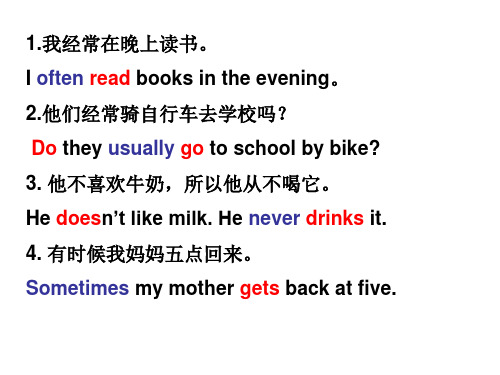
school? 5.Tom __s_t_u_d_i_e_s ( study ) English, Chinese, Maths, Science
and Art at school.
hardly ever等。 一般现在时常和以下时间表达法连用。
如:in the morning, in the afternoon, in the evening, at noon, at night,every day,on Sunday(s), at seven 等。
e.g. Do they have math in the morning?
一般疑问句:把be动词放于句首;用助动词do 提问,如主语为第三人称单数,则用does,同 时,还原行为动词。
1.A: How often _B_____ she exercise? B: Twice a week.
A. do B. does
C. doing
D. did
2. I __C____ like to drink milk.
She sleeps nine hours every night. It takes me two hours to do my homework every day. They don’t have classes on Sundays.
一般现在时练习 一.用词的适当形式填空。 1.What time___d_o_e_s___ his father__d_o______(do) the work? 2.He ___g_e_t_s___(get) up at five o’clock. 3.____D_o_____ you __b_r_u_s_h___(brush) your teeth every
(word完整版)初中英语七年级一般现在时、频度副词讲解及练习(2)

Unit 2 Daily life Grammar课堂练习一、一般现在时讲解及练习基本用法(1)一般现在时常表示经常发生的动作或经常存在的状态如: I go to school every day.表示此状态时,常和always, often, usually, everyday, sometimes等表示时间的状语连用,有时候时间状语可以不表示出来。
(2)表日常行为:如:The boy wake up at seven a'clock,wash ,dress quickly and run into the dining room for breakfast. They wait until they hear the bell and then go to school.(3)表习惯,能力等:如:Do you drive, Mike?(4)表客观存在:如:Fire burns火会燃烧(表客观事实)The earth moves round the sun.地球围绕太阳旋转(表客观真理)练习题:1. Tom is a worker. He _____ in a factory. His sisters _____ in a hospital.A. work/ workB. works/ workC. work/ works2. Who _____ English best in your class?A. speakB. speaksC. speaking3. Mrs. Read _____ the windows every day.A. is cleaningB. cleanC. cleans4. We _____ music and often _____ to music.A. like/ listenB. likes/ listensC. like/ are listening5. She _____ up at six in the morning. A. get B. gets C. getting6. On Sunday he sometimes _____ his clothes and sometimes _____ some shopping.A. wash/ doB. is washing/ is doingC. washes/ does7. The twins(双胞胎)usually _____ milk and bread for breakfast, but Jim _____ some coffee for it.A. have/ haveB. have/ hasC. has/ have8.Jenny ____ in an office. Her parents ____in a hospital.A work worksB works workC work are workingD is working work9. One of the boys_____ a black hat.A haveB there isC there areD has10. We will go shopping if it____ tomorrow.A don't rain Bdidn't rain Cdoesn't rain Disn't rain11. He said the sun ____in the east and ____in the west.A rose; setB rises; setsC rises, setD rise; sets12. Wang Mei ____ music and often ____ to music.A like; listenB likes; listensC like; are listeningD liking ; listen13. Jenny____ English every evening.A has studyB studiesC studyD studied14. She _____ up at six in the morning.A. getB. getsC. getting15.The students will go to the Summer Palace if it _____ tomorrow. A.don't rain B. doesn't rain C. won't rain16. The picture _______ nice.A. looksB.is lookedC. lookD.is looking17. Don't smoke until the plane ______ off.A. takes B .took C. was taken D.is take18. John is always ______ others.A. helpB. helpingC. helpsD. to help19. You'd better ______ at home and ______ your homework.A. to stay, doB. stay, doC. to stay, to doD. stay, to do20. Uncle Wang knows _______ a washing machine.A. how to makeB. to makeC. how makingD. what to make21. My father always __________(come) back from work very late.22. The teacher is busy. He __________ (sleep) six hours a day.23. Listen! Joan __________(sing) in the classroom. She often __________ (sing) there.24. __________ your brother __________(know) Japanese?25. Where __________ you __________ (have) lunch every day?26. The girl __________(like) wearing a skirt. Look! She __________(wear) a red skirt today.二、频度副词、短语用法及练习一般现在时常常与always, usually, often, sometimes, seldom, hardly, never等频度副词连用,表示动作发生的频率。
(完整)初一英语一般现在时讲解及练习
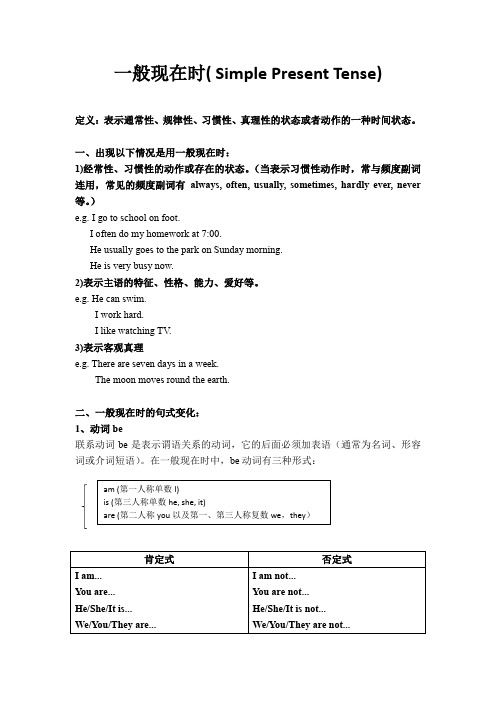
一般现在时( Simple Present Tense)定义:表示通常性、规律性、习惯性、真理性的状态或者动作的一种时间状态。
一、出现以下情况是用一般现在时:1)经常性、习惯性的动作或存在的状态。
(当表示习惯性动作时,常与频度副词连用,常见的频度副词有 always, often, usually, sometimes, hardly ever, never 等。
)e.g. I go to school on foot. I often do my homework at 7:00.He usually goes to the park on Sunday morning. He is very busy now.2)表示主语的特征、性格、能力、爱好等。
e.g. He can swim.I work hard. I like watching TV . 3)表示客观真理e.g. There are seven days in a week.The moon moves round the earth.二、一般现在时的句式变化: 1、动词be联系动词be 是表示谓语关系的动词,它的后面必须加表语(通常为名词、形容词或介词短语)。
在一般现在时中,be 动词有三种形式:一、用be的适当形式填空1.---How____ you? ---I____ fine.2.I___ David,and my family name___ Green.3.---What color ___ your clock? ---It___ white.4.---What___ this in English?---It___ an apple.5.Toy___my brother.David____my brother,too.They ___ my brothers.6.Look!These____apple trees.7.We____ good students and you____ good teacher.8.My sister and my brother_____ students.9. _____there many eggs in the kitchen?10.____your card number 5578?11.Where_____ your pencils?12.These sweaters ______ fifty dollars.13.How much ____ his jacket?14.My brother’s birthday____ December 11th.15.When _____ Kate’s birthday?16、There_____a boy and two girls beside the gate.17、Five and three ____ eight.二、.将下面的句子变成一般疑问句。
频率副词精讲精练(一般现在时专项练习)讲义 (2024年版)外研版英语七年级上册

频率副词精讲精练(一般现在时专项练习)一、副词的概念是指在句子中表示行为或状态特征的词,用以修饰动词、形容词、其他副词或全句,表示时间、地点、程度、方式等概念。
副词可分为:时间副词、频率副词、地点副词、方式副词、程度副词、疑问副词、连接副词、关系副词、表顺序的副词以及表完成的副词。
二、频率副词1.分类(1)表示动作或状态发生频率的副词(又称频度副词)注:often经常被very、quite修饰构成very often、quite often(2)表示具体频率常用到次数(3)e very 系列2.用法(1)位置a.I often get up at six. 放在实义动词之前b.S he is always busy. 放在be动词之后c.t wice、three times、every系列一般放在句尾d.s ometimes可放在句首、句中或者句末,often也可放在句末。
Sometimes she calls me.She calls me sometimes.She calls me often.(2)时态频率副词经常在一般现在时的句子中作状语。
考点:主谓宾结构时,当主语是第三人称单数的时候,后面的动词要加s或es (3)四句型转换a.变否定句:主系表结构:在be动词后面加not主谓宾结构:在动词前加don’t或者doesn’tb.变一般疑问句(必要时,I改成you, we 改成you)主系表结构:be动词提前She is always busy. →Is she always busy? Yes, she is. No, she isn’t.主谓宾结构:在句首加Do或者DoesHe speaks good English. →Does he speak good English? Yes, he does. No, he doesn’t.c.特殊疑问句(对划线部分提问)用How often对频率副词进行提问. 即:做某事的频率I sometimes visit my grandparents.How often do you visit your grandparents?一般现在时专项练习一、单项选择1.Lily doesn’t like swimming. She ________ goes swimming with her father.A.never B.always C.often D. usually2.—How often do you ride a bike with your brother?—________. You know it’s popular these days.A.More than an hour B.At weekends C.Twice a week D.Three times 3.The baby girl couldn’t walk well at first, but now ________ fall down.A.seldom B.always C.often D.sometimes 4.I _________ go shopping in big malls. Online (网上的) shopping is so easy.A.sometimes B.seldom C.usually D.always 5.—You look strong and healthy. ________ do you do sports?—I ________ play football after school every day.A.How much, often B.How long, seldomC.How often, usually D.How soon, sometimes6.She always finishes her homework on time. She ________ leaves it for tomorrow.A.usually B.sometimes C.never7.My friend doesn’t like music and he ________ goes to the concert.A.always B.usually C.never8.We ________ go to the cinema because we are always too busy with our work.A.always B.often C.never9.In England, people ________ use Mr or Mrs before their first names.A.never B.often C.always D.sometimes 10.Lucy ________ like watching movies, and she ________ goes to the cinema.A.doesn’t; often B.don’t; often C.doesn’t; never D.don’t; never 11.Lucy is afraid of dogs, so she ________ wants to have a dog.A.always B.usually C.sometimes D.never12.Mike is a good student. He ________ comes to school early. He is ________ late for school.A.often; always B.always; never C.never; sometimes D.sometimes; usually 13.Jane’s mother doesn’t like cooking. She ________ cooks at home.A.always B.usually C.often D.never14.—Why do you go to the swimming pool, Tom?—Well, it is too far from my home.A.always B.seldom C.usually D hardly15.My parents don’t like music and they _________ go to the concert.A.often B.usually C.sometimes D.never16.一______do you often eat dinner?一At 6: 30 p. m.A.Why B.What C.What time D.Where17.— ______ does your friend exercise? — On weekends.A.What time B.What C.When D.Where18.—________ does your father go to bed?—He usually goes to bed at ten o’clock.A.What time B.Where C.How D.Why19.—_________ do you go to see your grandparents?—On Saturday morning.A.How B.When C.Where D.Who20.He usually _________ his teeth _________ half past seven.A.brush; on B.brushes; on C.brush; at D.brushes; at21.He usually _________ home _________ work.A.go; before B.goes; when C.goes; after D.go; after22.Either Jim or Bob_________ computer games after lunch.A.play B.plays C.playing D.to play 23.—How often do you go to the cinema?—________. I only watch movies at home.A.Always B.Usually C.Sometimes D.Never 24.— _________ do you have lunch?—At about 12:00.A.What B.Where C.How D.What time 25.Tom ________ his room every day, so his room is very ________.A.clean; clean B.cleans; cleans C.clean; cleans D.cleans; clean 二、完成句子1~5 ACABC6~10 CCCAC11~15 DBDDD16~20 CCABD21~25 CBDDD26 twice27 often; Never28 never; plays29 What time does; go30 usually have lunch31 when do; go32 What time does he usually take a shower?33 He is never late for work.34 How often; get up; At six35 When does; take36 don’t do37 What time; get up38 What time39 What do40 doesn’t get41 What time42 When; exercise43 twice44 once45 always46 never47 doesn’t do48 brushes49 usually50 dresses51 works52 tells。
七年级英语频度副词讲解及练习

感谢观看
汇报人:XX
表示“另外”的副词辨析,如in addition, besides等
频度副词与时间连用的特殊情况
有些情况下,频度副词可以与 时间连用,表示某个动作发生 的频率
频度副词与时间连用时,需要 注意时态和语态的正确使用
频度副词与时间连用时,通 常放在句子的中间位置
频度副词与时间连用时,需 要注意语境和表达的准确性
添加章节标题
Part Two
频度副词的概念和分类
频度副词的定义
频度副词是用来表示动作发生的频率的副词,如“always”、“often”、 “sometimes”、“never”等。
频度副词通常放在动词之前,有时也会放在系动词之后。
频度副词可以用来修饰动词、形容词、副词或整个句子。
频度副词在句子中表示动作或状态发生的频率和次数。
频度副词有时可以放在句首, 但通常是ቤተ መጻሕፍቲ ባይዱ强调时才这样做。
在否定句中,频度副词通常放 在助动词之后,实义动词之前。
频度副词可以放在倒装句中, 但需要注意语序的调整。
Part Four
频度副词的练习
选择合适的频度副词填空
每天早上,我都会去跑步。( ) 我通常在周末去购物。( ) 她从不迟到。( ) 我们偶尔会去电影院看电影。( )
频度副词位置不当引起的语法错误
频度副词的位置应放在be动词、 情态动词之后,实义动词之前
常见错误:将频度副词放在句 首或句末,导致句子结构不完 整或语法错误
正确示例:I often go to the park on weekends. (频度副 词放在实义动词前)
错误示例:I am often go to the park on weekends. (频 度副词放在be动词之后)
仁爱英语七年级下册语法总结及练习题
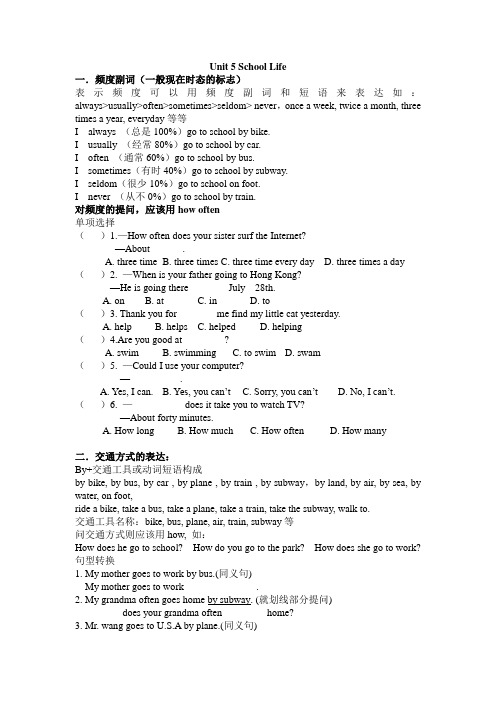
Unit 5 School Life一.频度副词(一般现在时态的标志)表示频度可以用频度副词和短语来表达如:always>usually>often>sometimes>seldom> never,once a week, twice a month, three times a year, everyday等等I always (总是100%)go to school by bike.I usually (经常80%)go to school by car.I often (通常60%)go to school by bus.I sometimes(有时40%)go to school by subway.I seldom(很少10%)go to school on foot.I never (从不0%)go to school by train.对频度的提问,应该用how often单项选择()1.—How often does your sister surf the Internet?—About ______.A. three timeB. three timesC. three time every dayD. three times a day ()2. —When is your father going to Hong Kong?—He is going there _______ July 28th.A. onB. atC. inD. to()3. Thank you for _______ me find my little cat yesterday.A. helpB. helpsC. helpedD. helping()4.Are you good at ________?A. swimB. swimmingC. to swimD. swam()5. —Could I use your computer?—__________.A. Yes, I can.B. Yes, you can’tC. Sorry, you can’tD. No, I can’t.()6. —__________ does it take you to watch TV?—About forty minutes.A. How longB. How muchC. How oftenD. How many二.交通方式的表达:By+交通工具或动词短语构成by bike, by bus, by car , by plane , by train , by subway,by land, by air, by sea, by water, on foot,ride a bike, take a bus, take a plane, take a train, take the subway, walk to.交通工具名称:bike, bus, plane, air, train, subway等问交通方式则应该用how, 如:How does he go to school? How do you go to the park? How does she go to work? 句型转换1. My mother goes to work by bus.(同义句)My mother goes to work ____ _____ ____.2. My grandma often goes home by subway. (就划线部分提问)_______ does your grandma often ________ home?3. Mr. wang goes to U.S.A by plane.(同义句)Mr. wang goes to U.S.A _____ ______.4.Miss Yang walks to work everyday . (改为同义句)Miss Yang goes to work ____ ____ everyday?5.My grandma usually takes the subway home. (就划线部分提问)your grandma go home?三、现在进行时:1. 定义:表示(说话瞬间)正在进行或发生的动作,。
频率副词讲解与练习
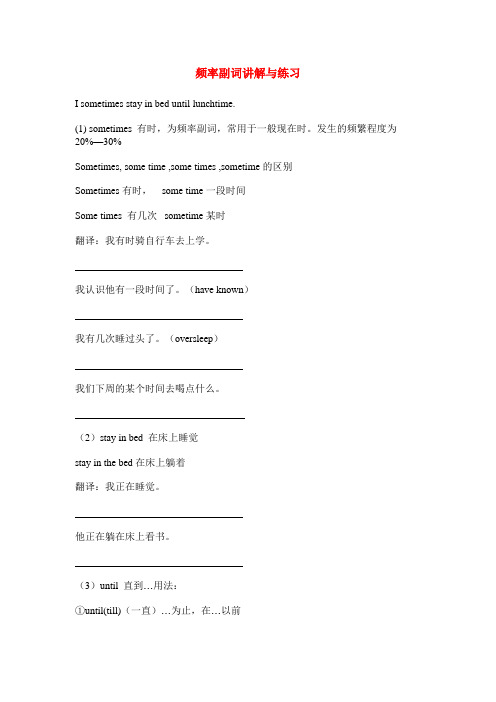
频率副词讲解与练习I sometimes stay in bed until lunchtime.(1) sometimes 有时,为频率副词,常用于一般现在时。
发生的频繁程度为20%—30%Sometimes, some time ,some times ,sometime的区别Sometimes有时,some time一段时间Some times 有几次sometime某时翻译:我有时骑自行车去上学。
我认识他有一段时间了。
(have known)我有几次睡过头了。
(oversleep)我们下周的某个时间去喝点什么。
(2)stay in bed 在床上睡觉stay in the bed在床上躺着翻译:我正在睡觉。
他正在躺在床上看书。
(3)until 直到…用法:①until(till)(一直)…为止,在…以前翻译:我一直等到三点钟,但他没来。
②(用于否定句)到…为止,直到…才翻译:直到午夜,大街上的噪音才停止。
(midnight, noise)选择She worked from eight ____ twelve.A byB atC onD till(4)lunchtime午饭时间,这是一个合成词,不能分开写。
Policeman ,iceland. 翻译:早餐时间晚餐时间他在我们午饭时间出去了。
I never get up early on Sunday讲解与练习I never get up early on Sunday.(1)① never不;永不。
表示否定含义。
翻译:他从不和别人打仗。
(fight against with others)她从不玩火。
(play with fire)经常考never在反意疑问句中的用法。
选择:He never go to school on time,___ ___?A doesn’t heB do heC does heD don’t he②never, sometimes, always是课文里出现的比较多的频度副词。
七年级一般现在时讲解与练习

一般现在时一、定义、用法:1.经常性、反复性的动作2.事实、真理二、标志词:always, often, usually, sometimes, seldom, never等频度副词;everyday等。
三、结构(两种)1.含be动词(am; is;are )-be动词口诀!肯定句:主语+be+其他He is a student.否定句:主语+be+not+其他He is not a student.一般疑问句:Be+主语+其他?Is he a student?特殊疑问句:特词+be+主语+其他?Who is he?2.不含be动词(动词原形/三单;do/does)肯定句: 主语+动词(原形/三单)+其他I usually walk to school.He usually walks to school.否定句: 主语+don’t/doesn’t+动词原形+其他I don’t usually walk to school.He doesn’t walk to school.一般疑问句: Do/Does +主语+动词原形+其他?Do you usually walk to school?Does he usually walk to school?特殊疑问句: 特词+do/does+主语+动词原形+其他?How do you usually come to school?How does he usually come to school?四、解题关键:1.判断是否用一般现在时(频度副词,every day)2.思考用动词原形还是三单?3.Be动词口诀灵活运用!牢记:1.be动词和动词是死对头,有你没我,有我没你!2.动词才配do/does; be动词配不上do/does!五、名词单数变复数(动词三单)规则变化:1.一般情况下+s2.以s, x, ch, sh结尾+ es3.以辅音加y 结尾,去掉y, +ies4.以f/fe结尾,去掉f/fe,+ves一般现在时练习一、将下列动词变为第三人称单数形式eat get tay have do go like play buy watch make finish live read listen drink swim run二、用词的适当形式填空。
外研版七英语上Unit 4 Time to celebrate 单元语法:频率副词和一般现在时 练习

外研版七年级上册新教材(讲义)Unit 4 Time to celebrate重点语法--频率副词和一般现在时在英文中用来表示动作频率的词被称为“频度副词”,例如:usually/sometimes/always/等,这些词在程度上有区别。
1. 意义:表示动作发生的次数、频率的副词。
always, sometimes, never,usually,often ...常用频度副词的频率排序:always 100%usually 90%normally 80%often 70%sometimes 50%occasionally 30%seldom 20%hardly ever 5%never 0%2. 频度副词出现的位置(用法):1.频度副词通常放在实意动词之前(1),be动词之后(2),如果句子中出现情态动词或助动词,则放在情态动词、助动词与实意动词之间(3)。
如:I always do homework in the afternoon.(1)He is never kind to us.(2)She can never know your secret.(3)2.频度副词的特殊位置:表示次数的频度副词,如once, twice,可以放在动词后或句末(4);有的频度副词也可放在句首表示强调(5)。
如:The car broke down twice.(4)Sometimes I go fishing with my dad.(5)3. 常用频度副词精讲:1. always 频率最高,表示动作重复、状态继续,表示“一直、总是”,其反义词为never。
always等与not连用时,表示部分否定。
如:The rich are not always happy. 有钱的人并不总是快乐的。
如果要变为否定句,应将always改为never才能全部否定。
如:Li Ping is always late for school. 李平上学总是迟到。
英语频率副词讲解加练习题

英语频率副词讲解加练习题
-
目录
选择正确的频率 副词填空
英语频率副词讲解加练习题
在英语中,频率副词用于表示动作或状态发生的频率。以下是常见的频率副词及其含义
Always:总是,一直 Often:经常,常常 Frequently:频繁地,屡次 地 Sometimes:有时,偶尔 Seldom:很少,不常 Never:从不,从未
英语频率副词讲解加练习题
使用频率副词时,通常放在动词之前,如果有助动词或情态动词,则放在其之后。此外, 频率副词可以与表示时间或数量的词一起使用,以更具体地表达某个动作或状态发生的频 率
以下是一些使用频率副词的示例
I always wake up early in the morning.(我 总是早上早 起:)
-
XXXX
感谢观看
汇报人:xxxx
时间:20XX.XX.XX
They neveபைடு நூலகம் forget to lock the door.(他们 从未忘记锁 门:)
He frequently goes to the gym.(他经常 去健身房:)
We sometimes meet for lunch.(我们 有时会见面 吃午饭:)
She seldom drinks coffee.(她 很少喝咖啡 :)
英语频率副词讲解加练习题
请注意,有些频率副词的意义可能有些 微妙的差异
例如,"always"表示100%的频率,而 "usually"则表示大部分时间或相当频 繁地发生某动作或状态
因此,在选择使用频率副词时,需要根 据语境和表达的准确含义来选择适当的 副词
英语频率副词讲解加练习题
选择正确的频 率副词填空
七年级下册英语 nit2知识点
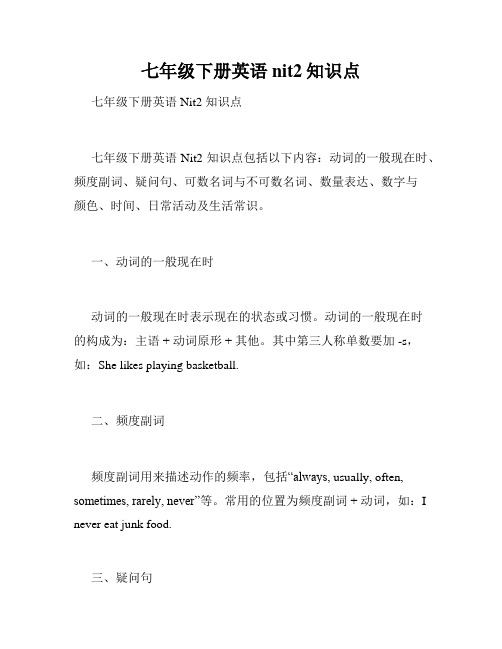
七年级下册英语 nit2知识点七年级下册英语 Nit2 知识点七年级下册英语 Nit2 知识点包括以下内容:动词的一般现在时、频度副词、疑问句、可数名词与不可数名词、数量表达、数字与颜色、时间、日常活动及生活常识。
一、动词的一般现在时动词的一般现在时表示现在的状态或习惯。
动词的一般现在时的构成为:主语 + 动词原形 + 其他。
其中第三人称单数要加 -s,如:She likes playing basketball.二、频度副词频度副词用来描述动作的频率,包括“always, usually, often, sometimes, rarely, never”等。
常用的位置为频度副词 + 动词,如:I never eat junk food.三、疑问句疑问句通常以疑问词开头,如:who, what, where, when, why, how等。
疑问句的构成为:疑问词 + 助动词/一般现在时动词形式+ 主语,如:What do you usually have for breakfast?四、可数名词与不可数名词可数名词是指可以数出个数的名词,如:book, cat等。
不可数名词是指不能数出个数的名词,如:water, milk等。
可数名词前可以用数词表示数量,不可数名词前不能用数词表示数量,只能用量词,如:a glass of water.五、数量表达数量表达有基数词和序数词之分,基数词表示数量的多少,如:one, two, three等;序数词表示顺序,如:first, second, third等。
六、数字与颜色数字和颜色在表达中十分重要,数字的记法可以参见0-100的数字表,颜色包括基本颜色,如:red, blue, green等。
七、时间时间的表达方式包括:时间点(如:8:00)和时间段(如:in the morning)。
表示时间点时可以用“at”引导,表示时间段时可以用“in”引导。
八、日常活动及生活常识日常活动包括吃饭、运动、娱乐等,生活常识包括交通方式、购物等,这些内容贯穿整个 Nit2。
- 1、下载文档前请自行甄别文档内容的完整性,平台不提供额外的编辑、内容补充、找答案等附加服务。
- 2、"仅部分预览"的文档,不可在线预览部分如存在完整性等问题,可反馈申请退款(可完整预览的文档不适用该条件!)。
- 3、如文档侵犯您的权益,请联系客服反馈,我们会尽快为您处理(人工客服工作时间:9:00-18:30)。
Unit 2 Daily life Grammar课堂练习一、一般现在时讲解及练习基本用法(1)一般现在时常表示经常发生的动作或经常存在的状态如: I go to school every day.表示此状态时,常和always, often, usually, everyday, sometimes等表示时间的状语连用,有时候时间状语可以不表示出来。
(2)表日常行为:如:The boy wake up at seven a'clock,wash ,dress quickly and run into the dining room for breakfast. They wait until they hear the bell and then go to school.((3)表习惯,能力等:如:Do you drive, Mike(4)表客观存在:如:Fire burns火会燃烧(表客观事实)The earth moves round the sun.地球围绕太阳旋转(表客观真理)练习题:1. Tom is a worker. He _____ in a factory. His sisters _____ in a hospital.A. work/ workB. works/ workC. work/ works2. Who _____ English best in your classA. speakB. speaksC. speaking·3. Mrs. Read _____ the windows every day.A. is cleaningB. cleanC. cleans4. We _____ music and often _____ to music.A. like/ listenB. likes/ listensC. like/ are listening5. She _____ up at six in the morning. A. get B. gets C. getting6. On Sunday he sometimes _____ his clothes and sometimes _____ some shopping.A. wash/ doB. is washing/ is doingC. washes/ does7. The twins(双胞胎)usually _____ milk and bread for breakfast, but Jim _____ some coffee for it.—A. have/ haveB. have/ hasC. has/ have____ in an office. Her parents ____in a hospital.A work worksB works workC work are workingD is working work9. One of the boys_____ a black hat.A haveB there isC there areD has10. We will go shopping if it____ tomorrow.A don't rain Bdidn't rain Cdoesn't rain Disn't rain11. He said the sun ____in the east and ____in the west.;A rose; setB rises; setsC rises, setD rise; sets12. Wang Mei ____ music and often ____ to music.A like; listenB likes; listensC like; are listeningD liking ; listen13. Jenny____ English every evening.A has studyB studiesC studyD studied14. She _____ up at six in the morning.A. getB. getsC. gettingstudents will go to the Summer Palace if it _____ tomorrow. 't rain B. doesn't rain C. won't rain&16. The picture _______ nice.A. looks looked C. look looking17. Don't smoke until the plane ______ off.A. takes B .took C. was taken take18. John is always ______ others.A. helpB. helpingC. helpsD. to help19. You'd better ______ at home and ______ your homework.A. to stay, doB. stay, doC. to stay, to doD. stay, to do》20. Uncle Wang knows _______ a washing machine.A. how to makeB. to makeC. how makingD. what to make21. My father always __________(come) back from work very late.22. The teacher is busy. He __________ (sleep) six hours a day.23. Listen! Joan __________(sing) in the classroom. She often __________ (sing) there.24. __________ your brother __________(know) Japanese25. Where __________ you __________ (have) lunch every day26. The girl __________(like) wearing a skirt. Look! She __________(wear) a red skirt today.[二、频度副词、短语用法及练习一般现在时常常与always, usually, often, sometimes, seldom, hardly, never等频度副词连用,表示动作发生的频率。
这些频度副词按发生频率的高低依次为:always→usually→often→sometimes→seldom→hardly→never。
频度副词在句中的位置比较灵活,但通常放在行为动词之前,系动词、情态动词或助动词之后。
1. always 意为“总是,一直”,这是频率最高的词,表示动作反复,状态持续,不间断。
其反义词是never,意为“从不”。
如果要变为否定句,应将always改为never才能全部否定。
另外,当always与进行时态连用时,常表示“总是”,带有厌烦、不满或赞美等感情色彩。
如:Li Ping is always late for school. 李平上学总是迟到。
Li Ping is never late for school. 李平上学从不迟到。
(全部否定)`Li Ping is not always late for school.李平上学不总是迟到。
(部分否定)The boy is always asking for money. 这个小男孩总是要钱。
(表厌烦)2. usually 意为“通常”,表示习惯性动作或状态,很少例外。
如:We usually go to school at seven in the morning.我们通常在早上七点上学。
My mother and I usually go shopping on Sundays.我和妈妈通常在星期天去买东西。
】3. often 意为“经常,时常”,表示反复性的动作或状态,中间有间断。
其反义词是seldom, 意为“很少,不常”。
often在句尾时常被very或quite修饰。
如:The boys often eat noodles and the girls sometimes eat them.男生经常吃面条,女生有时吃。
I often chat with my friends under the big tree.我经常在这棵大树下和朋友聊天。
He writes to his friends quite often. 他常给他的朋友写信。
4. sometimes 意为“有时”,表示动作偶尔发生,间隔较长。
其位置比较灵活,放在句首、句中、句末都可。
如:Sometimes we go to the cinema and at other times we go for a walk.】有时我们去看电影,有时我们去散步。
I sometimes watch TV in the evening. 我有时晚上看电视。
My father has lunch in the factory sometimes.我父亲有时在工厂吃午饭。
5. seldom 意为“很少,不常”,表示否定意义。
如:The little girl seldom goes out. 这个小女孩很少外出。
He seldom gives his wife a present, does he他不常给妻子送礼物,是吗,6. hardly 具有否定意义,表示“几乎不、简直不”,除非特殊情况,否则不会发生。
如:The boy is so young that he could hardly understand it.这个孩子太小了,不可能懂得这件事。
7. never 意为“从来不,从来没有”,也表示否定意义,它表示从未发生的动作或情况,没有例外。
如:The boys never eat chocolate and the girls seldom eat it.男生从不吃巧克力,女生很少吃。
*另外,once a year (每年一次), twice a week (每周两次), three times a day (一天三次), every Saturday afternoon(每星期六下午)等,这些时间状语也表示频率,它们可以和频度副词用在同一个句子中,表达上没有重复。
